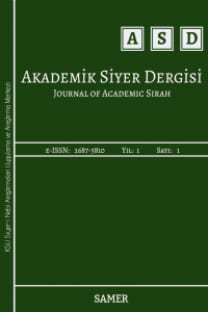Konsey (Mekke Liderleri)’nin Argümanları ve Mâtürîdî'nin Cevapları
Hz. Peygamber, insanları İslam'a davet ederken çeşitli tepki ve itirazlara maruz kalmıştır. Bu itirazlar, özellikle toplumun elit kesiminden gelmiştir. Kur’ân-ı Kerîm, onların argümanlarını parça parça anlatmış ve bunlara cevaplar vermiştir. Ebû Mansûr el-Mâtürîdî (333/944), bu cevapları ayrıntısıyla ele alarak söz konusu elit kesimin İslam’a yönelik itirazlarını çürütmüştür. İşte bu çalışma şu iki soruya cevap aramıştır: Mâtürîdî, elit kesimin itirazları üzerinde neden çok durmuş ve onlara cevaplar üretirken nasıl bir yöntem izlemiştir? Te’vîlâtü’l-Kur’ân’ın tamamının incelenmesi neticesinde varılan sonuçlar şu şekildedir: Elit kesim bir prototiptir. Onların itirazları hemen her devirde İslam’a yöneltilebilecek türden itirazlardır. İslam’a karşı hemen her devirde görülecek türden itirazlarda bulunmuşlardır. Bu nedenle onlara cevap vermek, bir nevi, ilerleyen süreçte öne sürülecek muhtemel itirazlara hazır cevap olacaktır. Mâtürîdî, söz konusu itirazları, üzerini örtmeden cesurca aktarmış ve ardından aklî verilerden hareketle ikna edici cevaplar vermiştir.
Arguments of the Council (the Leaders of Mecca) and Answers of Māturīdī
The Prophet was subjected to various reactions and objections when inviting people to Islam. These objections, in particular, belong to the elite of his society. The Qur’an described their arguments piecemeal and gave answers to them. Abū Manṣūr al-Māturīdī (333/944) addressed these answers in detail, refuting the objections of the elite in question to Islam. This paper seeks to answer the two following questions: Why did Māturīdī concentrate so much on the objections of the elite and which method he follow producing answers to them? As a result of studying the entire Taʾwīlāt al-Qur’ān, the conclusions are as follows: the elite is a prototype. Their objections are the kind of objections that can be directed at Islam in almost any era. They have made such objections to Islam that can be seen in almost every era. For this reason, responding to them will be a kind of ready response to possible objections that will be put forward in the future. Māturīdī courageously conveyed these objections without covering them and then gave convincing answers based on reasonable arguments.
Keywords:
Sirah, Tafsir, Māturīdī, Polytheists of Mecca Answers,
___
- Baba, Coşkun. Retoriğin İkna Gücü. Konya: Çizgi Yay., 2018.
- Buhârî, Ebu Abdullah Muhammed b. İsmâil. Sahîh-i Buhârî. Riyad: Dâru’s-Selâm, 1999.
- Cevad Ali. el-Mufassal fî târihi’l-Arab kable’l-İslâm. 10 Cilt. Bağdat: Bağdat Üniversitesi, 1413/1993.
- Gengil, Veysel. "Mekke Müşriklerini Mâtürîdî’nin Gözüyle Okumak". Sakarya Üniversitesi İlahiyat Fakültesi Dergisi 20/38 (Aralık 2018), 201-222.
- Günaltay, Şemseddin. İslam Öncesi Araplar ve Dinleri. Ankara: Ankara Okulu Yay., 1997.
- Mâtürîdî, Ebû Mansûr Muḥammed. Te’vilâtü’l-Kur’ân. nşr. Ahmet Vanlığlu. 18 Cilt. İstanbul: Mizan Yay., 2005–2011.
- Mukâtil b. Süleymân. Tefsîru Mukâtil b. Süleymân. 3 Cilt. Beyrut: Dâru’l-Kütübi’l-İlmiye, 2003.
- Râzî, Fahreddîn Muḥammed b. Ömer. Mefâtihu’l-Gayb. 32 Cilt. Mısır: y.y., 2003.
- Saʿlebî, Aḥmed b. Muḥammed. el-Keşf ve’l-beyân fî tefsîri’l-Ḳurʾân. 6 Cilt. Beyrut: Dâru’l-Kütübi’l-İlmiye, 2003.
- Ṭaberî, Muḥammad b. Cerîr. Câmiu’l-beyân an te’vîli âyi’l-Kur’ân. 30 Cilt. Beyrut: Dâru İbn Hazm, 2002.
- Zeccâc, Ebû İshâk İbrâhim b. es-Serî ez-Zeccâc. Kitâbu’l-meâni’l-Kur’ân ve i‘râbühû. thk. Abdülcelil Abdüh Şelbî. Beyrut: Âlemü’l-Kütüb, 1988.
- Yayın Aralığı: Yılda 2 Sayı
- Başlangıç: 2020
- Yayıncı: Kahramanmaraş Sütçü İmam Üniversitesi
Sayıdaki Diğer Makaleler
Şia’nın Meşruiyet İddiaları ve Siyer'in Tahrifi
Hz. Peygamber’in Hicretine Dair Bazı Mülahazalar
Siyer Kaynağı Olarak Seyahatnâmeler -İbn Battûta Seyahatnâmesi Örneği-
İslâm Öncesi Dönemdeki Kabile İttifaklarının İslâm Tebliğine Yansıması: Huzâa-Hâşimoğulları Örneği
Kur’an-Siyer İlişkisi Bağlamında Hz. Peygamberin Dâvete Başlaması ve Gizli Dâvet Döneminin Mahiyeti
Mustafa HOCAOĞLU, Öznur HOCAOĞLU
Son Peygamber Muhammed -Doğuşu, Karakteri ve Öğretisi
Konsey (Mekke Liderleri)’nin Argümanları ve Mâtürîdî'nin Cevapları
